REMEMBERING S. L. THEVAR
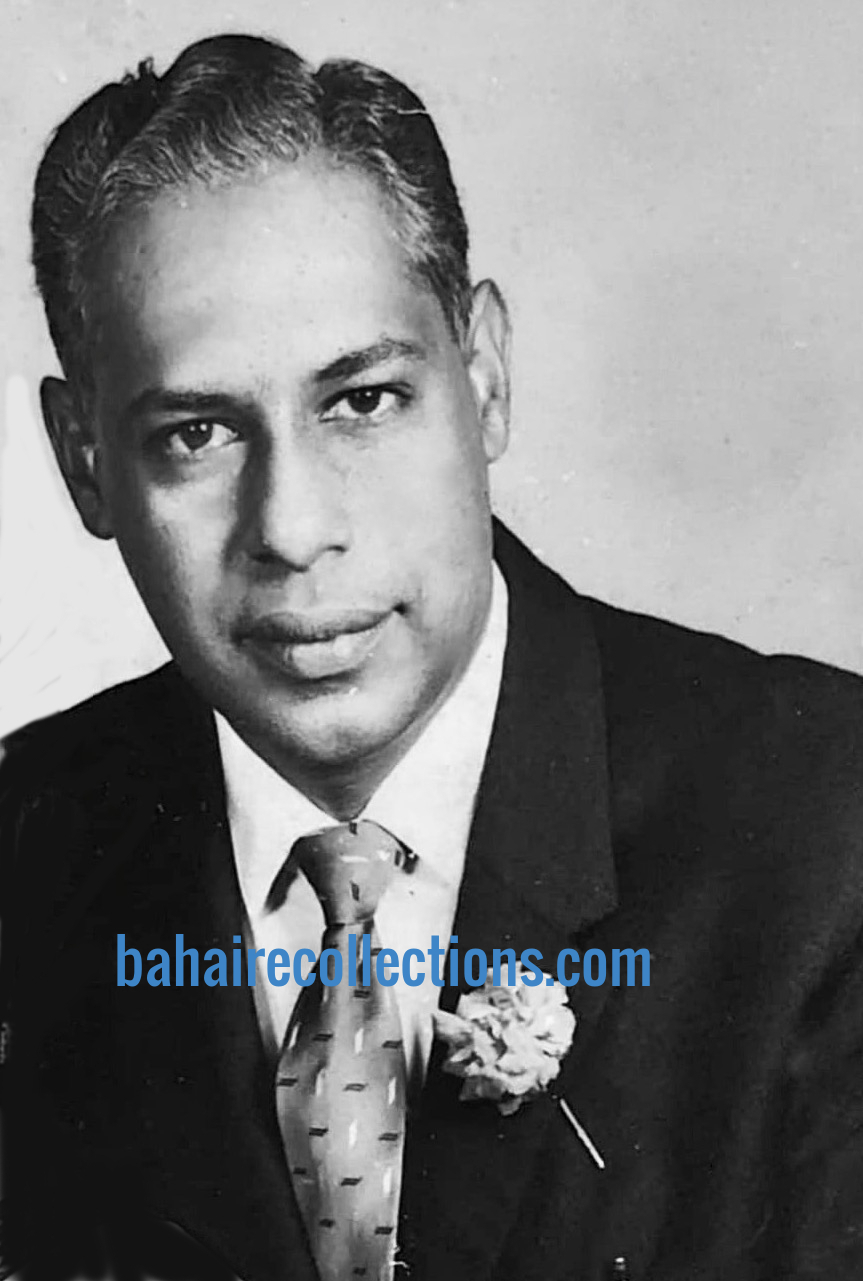
12 March 1927 to 4 April 1999
This is a moving story of how a husband and wife teamed up perfectly well and supported each other in serving the Faith tirelessly until the end of their lives. In both family matters and in serving the Faith they drew strength from each other and became a role model for many during their lifetime.
Mr. Suppiah Lechumanan Thevar, popularly called S. L. Thevar was born in Malacca on 12 March 1927. His father was headmaster in Penang Free School. His mother was the first non-white headmistress in then British Malaya. Thevar’s mother was a Christian and his father a Hindu, but they did not practice any religion at home. Thevar was basically a free thinker and an independent-minded person since young. During the Second World War, when Thevar was still in his late teens, he was sent to Japan to be trained as an officer in the Indian National Army to liberate India from the British. However, by the time Thevar returned to India to join others in liberating the country from British rule, the war was over. In India, Thevar pursued some studies on administration at the request of his father, and after completion of his studies, he came back to Malaya and joined the Malayan Civil Service, when the country was still under British rule.
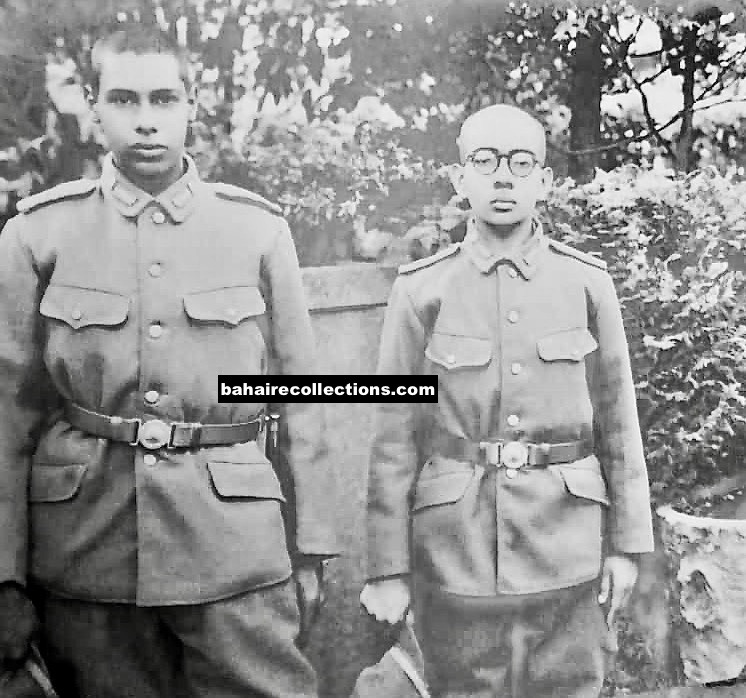
Thevar, left, as a teenager undergoing training in Japan
Thevar came to know about the Faith while in Penang when he was given the book “Bahá’u’lláh and the New Era” by John Esslemont. As an intellect with keen mental bearing, he raised many questions after reading the book, but he was not given clear answers to satisfy his quest. Yet, after deeper investigation and keen reflection, he accepted the Faith in Penang on 5 October 1959. That was the beginning of forty years of tireless, relentless, and committed service for the Cause of Bahá’u’lláh in various capacities. As soon as he accepted the Faith, Thevar got transferred to Kuala Lumpur to work as a Chief Clerk with the Tuberculosis Clinic. Just before accepting the Faith, Thevar went to India on the persuasion of his parents and got married to Miss Philomena Sakunthala who was a distant relative.
His coming to Kuala Lumpur was timely, as the Bahá’í community was struggling to have the Local Spiritual Assembly elected each year, with Mr. Wong Kok Meng, holding the fort as a kind of lone-ranger. Taking cognizance of the sad situation in Kuala Lumpur, some believers from other communities visited Kuala Lumpur often to give a helping hand to raise the community to a higher pedestal. Leong Tat Chee from Malacca and Yankee Leong from Seremban were among those who came quite often. In 1960, Thevar was elected to the Local Spiritual Assembly of Kuala Lumpur and became its secretary. He then wrote a letter dated 19 May 1960 to the Local Spiritual Assembly of Penang asking for the transfer of his declaration card to Kuala Lumpur. As Secretary of the Local Spiritual Assembly of Kuala Lumpur, he worked arduously for the progress of the Cause and the community. It was in Kuala Lumpur that he read about the Faith widely and got a deeper understanding from the visitors from abroad, and at various conferences. It was in October 1960 that he was privileged to attain the presence of Hand of the Cause of God Mr. Collis Featherstone when the latter came for his first visit to the country. That meeting created yet another impact upon his soul. Thevar, as a believer of the Ten-Year Crusade period, had the bounty of attaining the presence of several Hands of the Cause of God who came to Malaysia and participating continuously in most major events in the country. He was one of those who was well-known among the earliest builders of the foundation in this country.
During his tenure as Secretary of the Local Assembly in 1960, many activities were successfully initiated. He set such a high standard of administrative procedures in accordance with the Bahá’í principles that the report of the Second Pan Malayan Teaching Conference held in December 1961 in Kuala Lumpur read: “S. L. Thevar’s special abilities as a most efficient secretary have been recognised by most Bahá’ís who have had the good fortune to have had dealings with him.” With the hard work, he undertook along with other believers, by the end of 1960 the Bahá’í community in Kuala Lumpur had about 20 believers. In 1960 when the National Centre Building Committee was officially formed to expedite the acquisition of a Bahá’í Centre in Kuala Lumpur, Thevar was appointed on to this Committee. He was also appointed to be a representative of the Area and State Teaching Committee to develop the Kuala Lumpur area.
Although Thevar proved to be an able administrator and a good organizer, his passion was always for field teaching and he was always ready to go for teaching trips. During his stay in Kuala Lumpur for about one year, he had undertaken teaching trips open up the towns of Klang, Rawang, and Kuala Kubu Baru, apart from teaching in Kuala Lumpur itself.
In 1961, the dynamic Thevar was transferred from Kuala Lumpur to work in the Land Office in Temerloh town in the state of Pahang. Thevar was the first and the only key believer in Temerloh as he arrived there in 1961. He realised he had much to do for the Cause and started to teach the Faith to his friends. The Faith in Temerloh started to take root with his active involvement during the two years he was there. Thevar’s first child, a baby girl Shyama Evelyn Thevar was born on 17 November 1961, and the joy Thevar had was boundless.
Thevar was then posted to Kuantan town in the same state as Pahang in 1963. In early 1963, there were three believers in Kuantan. From the time Thevar came to Kuantan, he concentrated on building this community. Using Thevar’s house as the base, intensive teaching activities took place. In 1963, Bahá’ís from Malacca and Seremban visited Kuantan and other east coast places for teaching. In the mid-1960s, the Bahá’ís from the West Coast of Malaysia undertook some teaching trips to introduce the Faith to several places in the East Coast and that included Kuantan town as well. Thevar as the Chairman of the National Teaching and Consolidation Committee at that time gave a helping hand in arranging their visits to the towns of Kuala Terengganu, Kemaman, and Dungun in the state of Terengganu, and the town of Kota Bahru in the state of Kelantan. Thevar’s house was therefore a springboard for opening up new areas for the Faith in the East Coast.
Meanwhile, in 1963 when Shyama was two years old, Thevar’s wife Philomena passed away suddenly in Kuantan. That was the time when Philomena was expecting her second child. When she was admitted to the hospital the doctors had injected penicillin, without testing if she was allergic to penicillin. As she was allergic to penicillin, she dropped dead. Thevar was very devastated, not knowing how to bring up his infant daughter. Philomena being from the Anglican Church was not a believer in the Bahá’í Faith. Respecting her belief, Thevar had some church-going ladies to dress her before giving her a befitting burial. Thevar had to move on with life and he derived his spirit and strength in the Faith. Thevar was interested in teaching the Cause, but being unable to speak in the Tamil language he was looking for a translator. It so happened that while Thevar was on the lookout for a translator an early believer of Kuantan from the Chinese background by the name of Mr. Koh took Thevar to the home of the mother of Miss Arputha Mary in Semambau Village in the suburbs of Kuantan town. There Thevar gave the talk in English to the family which was translated by Arputha Mary known as Mary. This family belonged to the Protestant denomination of the Christian Faith and was actively involved in the activities of the Methodist Church. Mary was also a kindergarten teacher at the Methodist Girls School in Kuantan. Thevar continued to teach her the Faith and gave biblical proofs on the return of Christ. The claim of Bahá’u’lláh as the Promised One of all ages and the return of Christ in the Glory of the Father was for Mary too strong to accept. But one day she had a dream, which she immediately related to Thevar. In her dream, Jesus Christ appeared and told her, “I have returned, and why have you not accepted Me?” Thevar immediately invited her to the Bahá’í Centre, which was his home at that time. There, Mary saw ‘Abdu’l-Bahá’s picture on the wall. Startled, she exclaimed, “This is the same man in my dream.” Thevar immediately sat with her and explained about ‘Abdu’l-Bahá and His station in the Bahá’í Faith. With no further reservations, Mary accepted the Faith and decided to dedicate her entire life to the Cause.
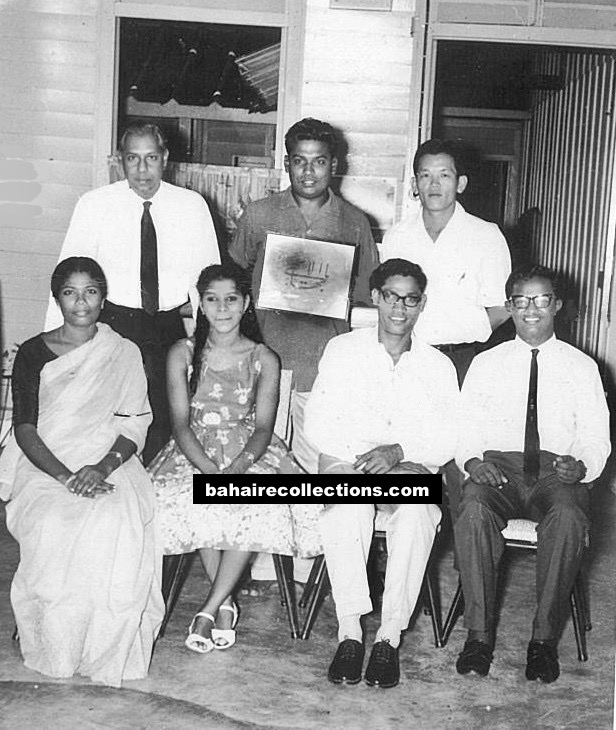
A budding Kuantan community in early 1964. At the extreme left is Miss Arputha Mary, and at the extreme right is T.K. Kannan visiting from Terengganu where he was teaching. Holding the symbol of the Greatest Name is Pavadai. Standing at the extreme left is Thevar
In 1964, the Local Spiritual Assembly of Kuantan was formed. Thevar married Mary on 20 December 1964 in Seremban Bahá’í Centre followed by a tea reception. The marriage received the widest publicity in the Bahá’í News Magazine published by the National Spiritual Assembly of the Bahá’ís of the United States. A photograph of those who came for the reception was published in the magazine along with this news. Some more than one hundred believers in the southern part of Malaysia attended this reception in Seremban. S. Satanam who became his closest friend says he was tasked with arranging the tea party with M$50, which was a huge sum in 1964. Back in Kuantan town, there was widespread talk about two “Indians” getting married without a priest and according to a new religion called “Bahá’í”. That marriage was one single occasion the word Bahá’í was on the lips of many people for some time to come. This marriage opened a new and dynamic chapter in the life of Thevar with Mary becoming Thevar’s perfect companion in life and in the field of service. Soon Mrs. Thevar brought her ycousin sister Mrs. Maria and Maria’s husband Paul Munusamy into the Faith. In stages all the children of Maria too accepted the Faith and rose to serve the Cause with distinction.
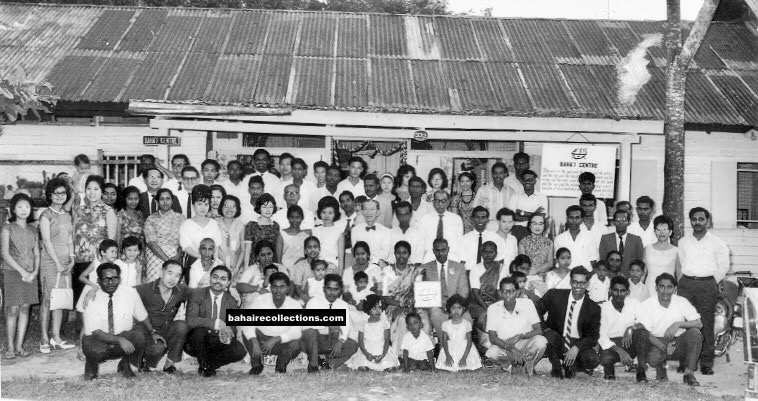
Wedding reception at the Bahá’í Centre in Seremban
Sometime after the marriage, Mary resigned as a teacher to be a full-time homemaker and teacher of the Cause. This marriage was the beginning of a union that saw them opening their homes and serving the Faith as one single soul in two different bodies, till the passing of Mary. They consulted on each and every family matter and proved to be a perfect union. In all aspects of the Faith, nothing was undertaken without the couple consulting with each other. Thevar was very fluent in the English language and had a great proficiency in the language. Conversing with him was such a pleasure and always uplifting. In his conversations, Thevar chose the right words with great care. He always spoke with exalted and emphatic tones when giving the Faith at firesides. But he had one weakness. He could not converse well in the Tamil language in which his wife was fluent. Thevar’s marriage to Mary in a way enabled him to learn the Tamil language to teach the Faith to the simple people. This marriage brought forth two children. The elder, a girl born on 24 October 1966 was named Chitra Sakunthala Thevar in remembrance of his first wife – Philomena Sakuntala. The second was a son Ahilan Sumander Thevar born on 26 August 1968.
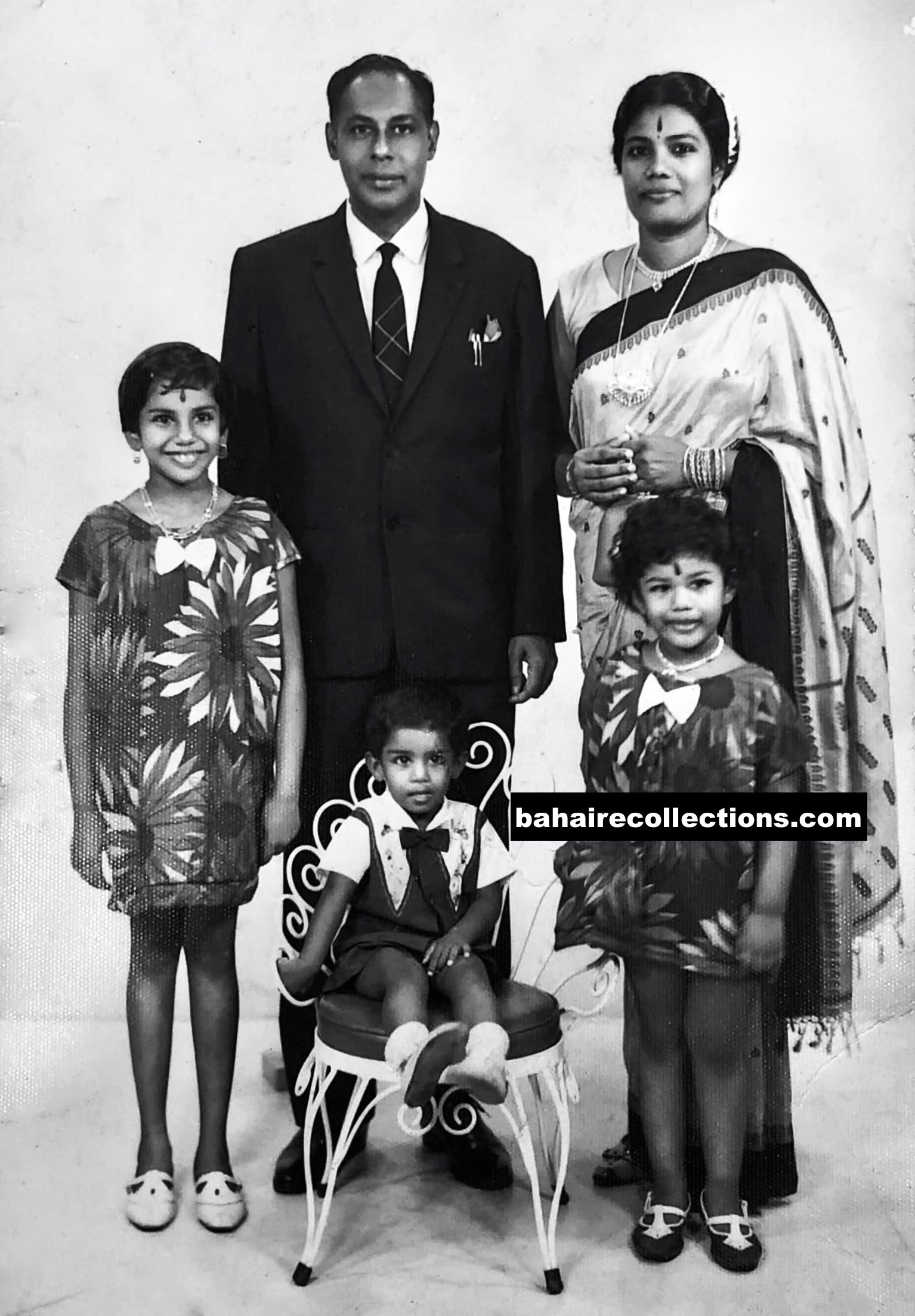
Early photo of the family of the Thevars. Children L-R: Shyama, Sumander and Chitra
Their home was the Bahá’í Centre for the Kuantan community. Most of the activities were held in their home. The Thevars indeed became the focal point around whom the believer rallied. There were regular firesides and Nineteen Day Feasts. The Thevars devoted Saturdays for traveling outside Kuantan for teaching activities in the nearby estates, with his wife presenting the Message in the Tamil language.
In 1967, Thevar was transferred from Kuantan to work in the courts in Kuala Lumpur. With that transfer, they resided in Kajang town, where the couple was again giving all the needed assistance to the Kajang community and participated in all the activities in Kuala Lumpur. From Kajang, they moved to Setapak in 1969. In Kuala Lumpur, they were involved in daily teaching. The Thevars visited the home of the three Sinhalese sisters – Mona, Molly, and Irene at their home and they accepted the Faith in 1970. In 1972, the Thevars moved to their own house in Happy Gardens in Petaling. At this time, Thevar was working as Chief Clerk in the High Court in Kuala Lumpur, and his home once again became a centre of activities. Thevar was actively serving on the Local Spiritual Assembly of Petaling for many years. He was also a favourite speaker at firesides organised in the region, and he used to present the Faith with his excellent command of the English language. For the youth from outstation, Thevar’s home was a sanctuary and shelter. When Thanabalan returned from travel teaching in Africa in early 1973, he rented a room in their house, until he married Maureen on 30 June 1974. Mary was a very good cook who provided excellent hospitality for them. Mr. Lum Weng Hoe was one youth who avoided the Faith when the Faith was given in Petaling Jaya and transferred his residence and stayed close to the home of the Thevars in Happy Garden. He befriended the Thevars and through their sincere gesture and kindness and hospitality accepted the Faith. Whenever Mary met youths at any gathering she would invite them to her home for meals. She enjoyed cooking and threw lunches and dinners to have a constant flow of visitors to her house. On Sundays, she would organise heavy breakfast as well. Their home buzzed with activities. Almost every evening this family used to take early dinner and drove down to visit friends for fellowship. They also took their children on such trips. Almost every week during their stay in Happy Gardens, Mr. and Mrs. Thevar made teaching trips to several places in Selangor, both urban and rural. Youth like Ayahkannu, T. Maniam, and Apparao were among those who accompanied them for such teaching trips to the rural areas. Whenever Dr. Sreenivasan wanted to approach the Tamil-speaking enquirers, he relied heavily on the service of Mary.
The one other activity, unbeknown to many was their quiet involvement in charity works. Giving to the needy was part of their life. They would often visit orphanages, especially the Pure Life Society in the Puchong area, and donate whatever they could to assist the needs of the orphans. They also taught their children to donate to the poor and needy instead of having lavish birthday celebrations. Mary was by nature a very generous-hearted person. Generosity was simply second nature in her. Many years later, S. Satanam related to his close friends, with emotions, that when he and some friends were teaching in Kuantan, a poor lady with little children cried to Mary about her poverty. Mary immediately took off her gold chain from her neck and gave her. Satanam was almost in tears when he witnessed that incident. Likewise, when she was a kindergarten teacher there was a boy whom the other teachers looked down on as he was a slow learner. But Mary showed much concern for him and trained him personally. That boy later drew a very beautiful portrait of the Thevars, which they kept with them when still alive and now in the possession of the children.
In 1977, their eldest daughter Shyama was sent to India to take up a bachelor’s degree in economics at the Holy Cross College in the city of Trichirappally of Trichy. It was in the same year that there was a call for the Tamil-speaking believers to pioneer to India. Mrs. Thevar at that advanced age expressed her desire to pioneer with the family. At that time Mary was not too well. She was a juvenile diabetic (diabetic from her teen years) and insulin-dependent. Yet she wanted to make Bahá’u’lláh happy through this one service of serving the Cause abroad. Thevar was English-educated while Mary was fluent in her Tamil language. To fulfill Mary’s desire, Thevar agreed to rise to the call. At that time Thevar was holding the position of Senior Clerk in the Welfare Department. Instead of waiting for his compulsory retirement at the age of fifty-five, he went on optional retirement at the age of 50 to pioneer to India. The several friends who had known the family were sad to see them leaving, including the Tamil-speaking friends. The Petaling Jaya community threw a farewell tea party which was a joyous and sad occasion. But they did not fail to admire the Thevars for setting such a fine example of pioneering at an old age and taking along their children. In July 1978, Mr. and Mrs. Thevar pioneered to Tamilnadu with their children – daughter Chitra and son Sumander and who were well trained in the children’s classes to serve the Cause. The children were sent to the New Era High School in Panchgani, Maharashtra, India while the Thevars were involved in the day-to-day pioneering activities.
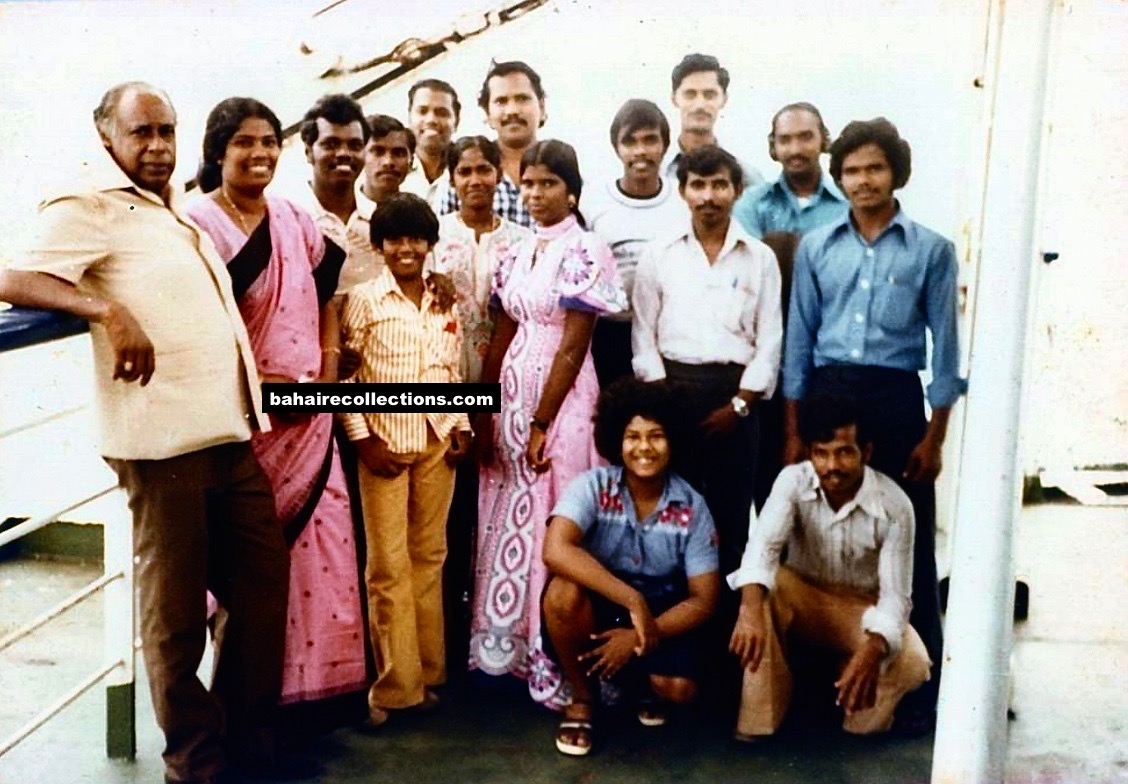
Onboard the Ocean Liner Chidambaram in Port Klang. Some believers from Sungei Buloh Estate and from Petaling Jaya came to send them off
Hand of the Cause of God Dr. Raḥmatu’lláh Muhájir spotted Thevar in Chennai, the capital city of Tamilnadu. On a number of occasions, Thevar had received Dr. Muhájir from the Subang International Airport in Malaysia when the latter came on a visit. They had known each other back in Malaysia. As soon as Dr. Muhájir’s eyes fell on Thevar, he asked him what he was doing in India. Thevar explained that his family had come for pioneering when the call for pioneering came a call that was initiated by Dr. Muhájir himself. Dr. Muhájir who was very pleased appreciated him and mentioned that the Tamil-speaking believers from Malaysia could cause waves in India through their ever fruit-bearing services.
Upon arriving in Tamilnadu, India, they established their base in the city of Trichy. But life was not easy for them. They had suddenly uprooted themselves from their comfortable life in Malaysia and plunged into an unknown and alien life, with lots of culture shocks in store. One of the first major activities was the organising of a large-scale teaching conference in Trichy.
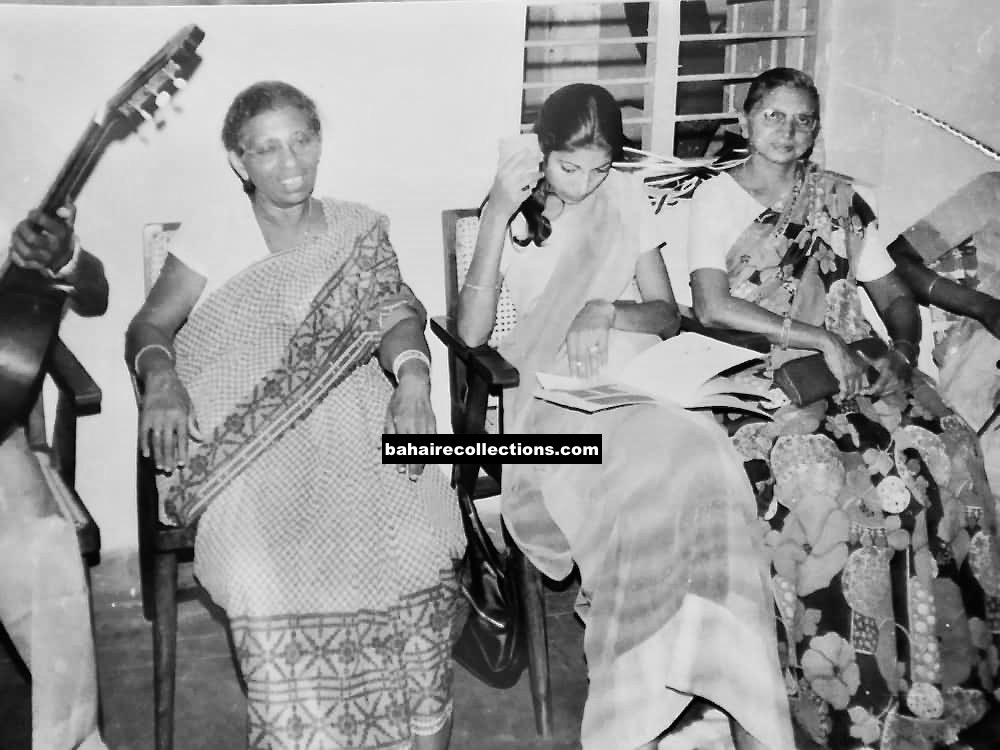
Visitors to the home of the Thevars on the eve of the Bahá’í Conference in Trichy. L-R: Mrs. Achuthan, Rani Datwani and Mrs. Latiff
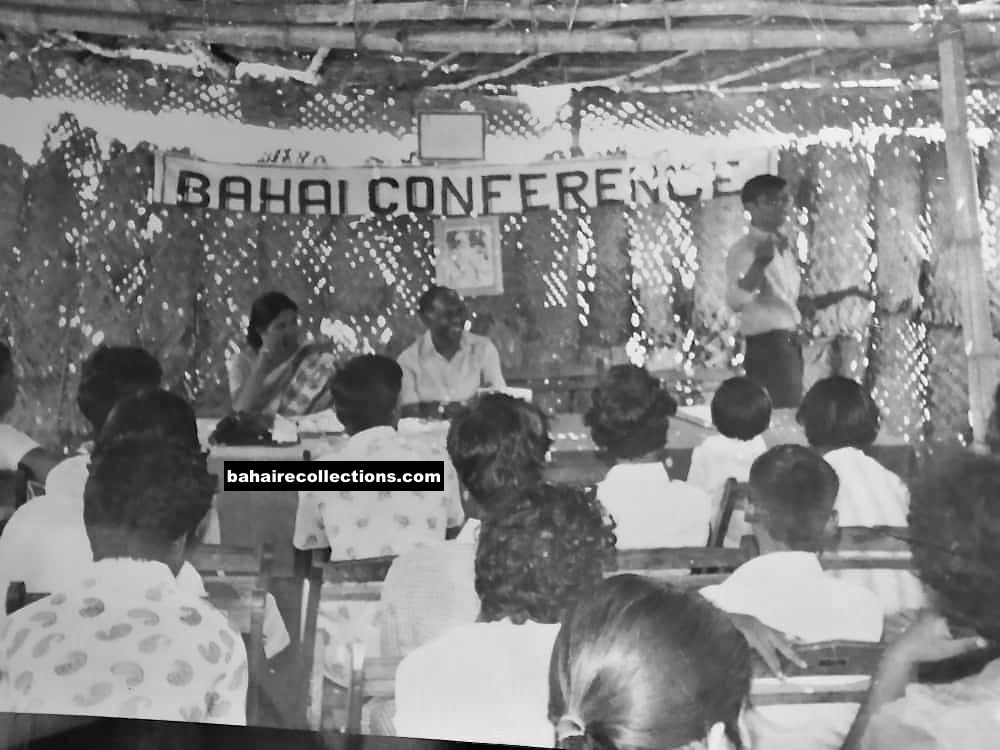
The Thevars seated at the main table, with Malaysian pioneer Doraisamy speaking at the Bahá’í Teaching Conference
Shortly after arriving in Trichy, Mrs. Thevar developed a big ulcer between her first and second toe fingers, and the doctor said she may have to amputate her foot. Thevar urged his wife to return to Malaysia for treatment while he would stay on and continue serving. But she totally rejected the idea and decided to stay on in the pioneering field and resorted to prayers, leaving her fate in the hands of the True Physician Bahá’u’lláh. Eventually, through the grace of Bahá’u’lláh, her wound healed, much to the puzzlement of her family doctor. The Thevars saw the helping hand of Bahá’u’lláh in times of distress, and they could continue their teaching activities.
In 1979, Thevar was appointed Auxiliary Board member for Propagation and he travelled extensively. In accompanying Thevar to the villages, Mary served as his eloquent translator. In the several visits to the villages, they developed a good rapport with them and won their hearts. By and large, the caste system had eaten into the fabrics of the Indian society and this ill practice was showing its ugly face at any given opportunity. The Thevars adhered tenaciously to the teachings of the Cause and showed their sincere and genuine love for them by taking drinks and meals in their huts. On many occasions, the villagers were also invited to their home in Trichy town. The village people saw in the Thevars that they truly practiced what they preached. That gesture alone became instrumental in the Thevars creating inroads into the villages and into the hearts of those dwellers.
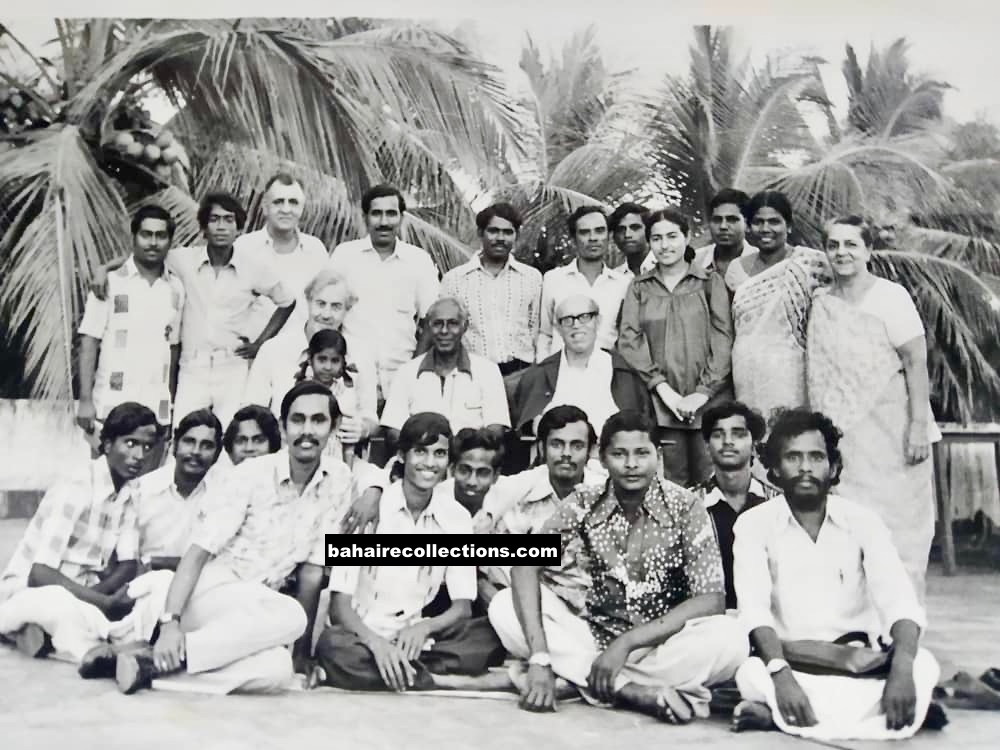
Three Board members seated L-R: Mr. McDonald, Mr. Thevar and Mr. Bahá’í Poostchi at a gathering in Karaikkal town opened to the Faith during the Ten-Year Crusade period by Knight of Bahá’u’lláh Mrs. S. M. Noorani standing at the extreme right
Thevar by himself was already picking up the Tamil language well and had a great influence in increasing the teaching intensity in Trichy. By Ridván 1979, a new Bahá’í Centre was rented in the heart of the city. In 1980, Mrs. Thevar served as Chairperson of the Local Spiritual Assembly of Trichy. The Faith was already placed on a higher pedestal in Trichy within the first three years of their arrival there. In February 1981, the family moved to the city of Madurai on the advice of the Counsellors, to strengthen the community there. In Madurai too Mrs. Thevar, despite her illness, went to teach in many villages with full devotion and sincerity. She cooked Malaysian food for the Bahá’í youth and provided good hospitality for them, as having done in Malaysia. There were a number of Persian students who found the home of the Thevars a sanctuary. To the Persian youths, the Thevars were their own parents to whom they could confide all matters and a shoulder to lean on emotionally and spiritually. Their devotion to the Faith attracted many to the Faith. There was a time when the Sri Lankan refugees came to Madurai city in large numbers and were placed in resettlement areas. The Thevars sent them food and other basic necessities. There was a time when the Thevars fed a homeless beggar daily until they stayed in the city of Madurai. Whenever the poorest came by the gate, Mary would pack some food and hand it to a person, foregoing her own share at times.
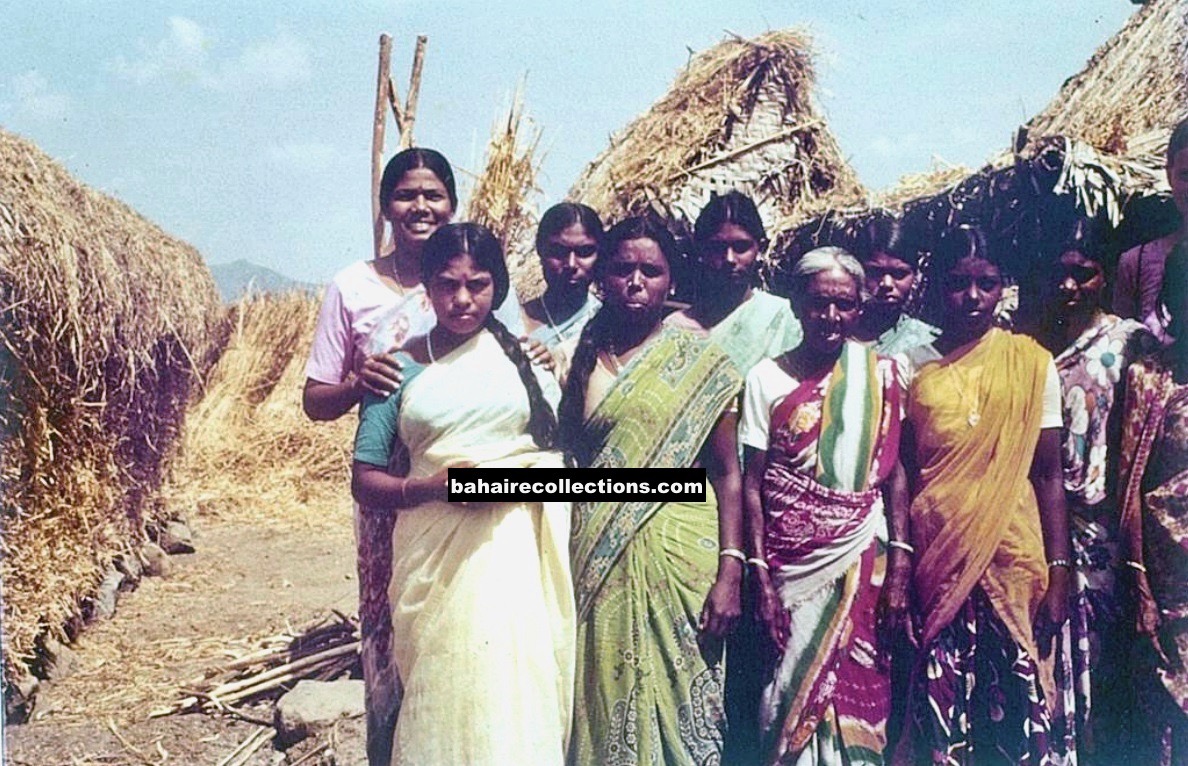 Mary at the extreme left, among some women in a village near Madurai city
Mary at the extreme left, among some women in a village near Madurai city
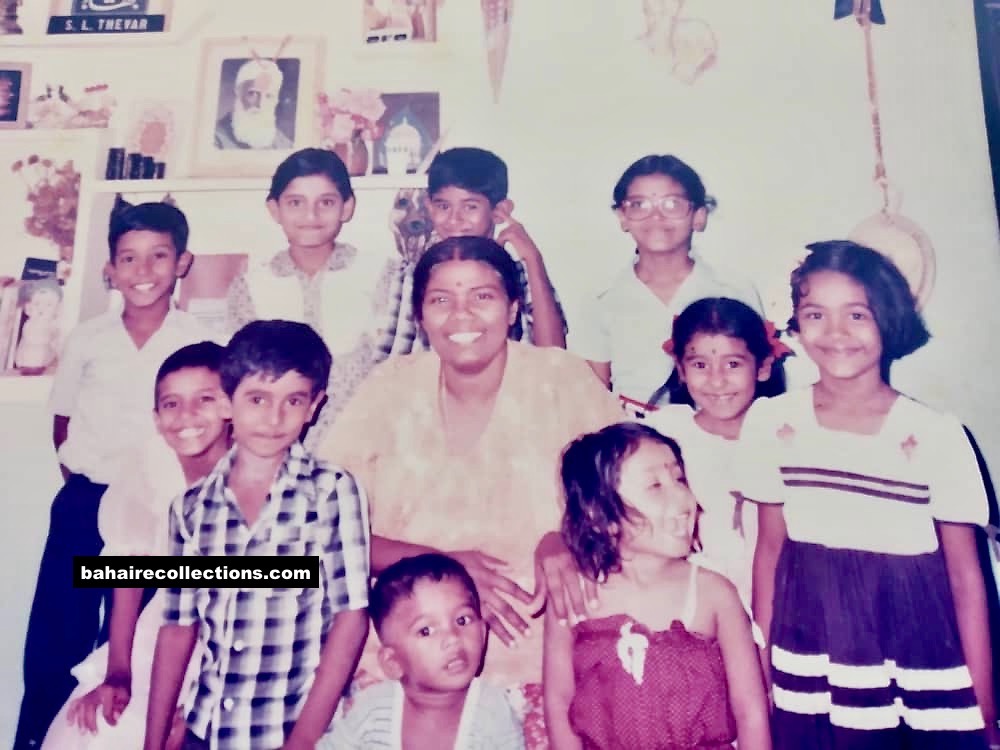
Mary among children who attended her children’s classes in Madurai
In Madurai, their range of activities also widened. Their activities were holding children’s classes, youth programs, women’s activities, prayer meetings, study classes, deepening gatherings, educating the poor children, helping poor families, and involving in charitable causes. Thevar concentrated on running youth deepening classes. In the absence of a telephone at home, they had to visit people door to door to remind the believers about the meetings. Buses do not go into the remotest villages. They had to take buses to the town nearest to the village and walk miles to reach the interiors. When buses did not run to some villages, Thevar rented bicycles and rode, with Mary sitting at the back. Thevar was never a cyclist, but it was in such moments that he took up cycling for the Cause These were challenging times, but they never gave up and kept going for their committed meetings.
It must be said that they did undergo many tests and tribulations while in India. Yet they had inner happiness derived from those very sufferings. They loved India with all its scorching heat, dust, and congestion in life as there was so much work to do be done for the Faith. While they were enjoying every moment of serving the Cause in India, they were dictated by circumstances to return to Malaysia. The new immigration regulation required them to have long-term visas to stay on in India, and the renewal process and requirements were becoming extremely difficult. That was also the time when Mary’s health was also deteriorating fast. It was really with a very sad and heavy heart that they had to reluctantly return to Malaysia in June 1985, after toiling for the Faith for seven years. The believers in Tamilnadu were extremely sad to see them return to Malaysia. The Chennai community gave a farewell party in the Chennai Bahá’í Centre.
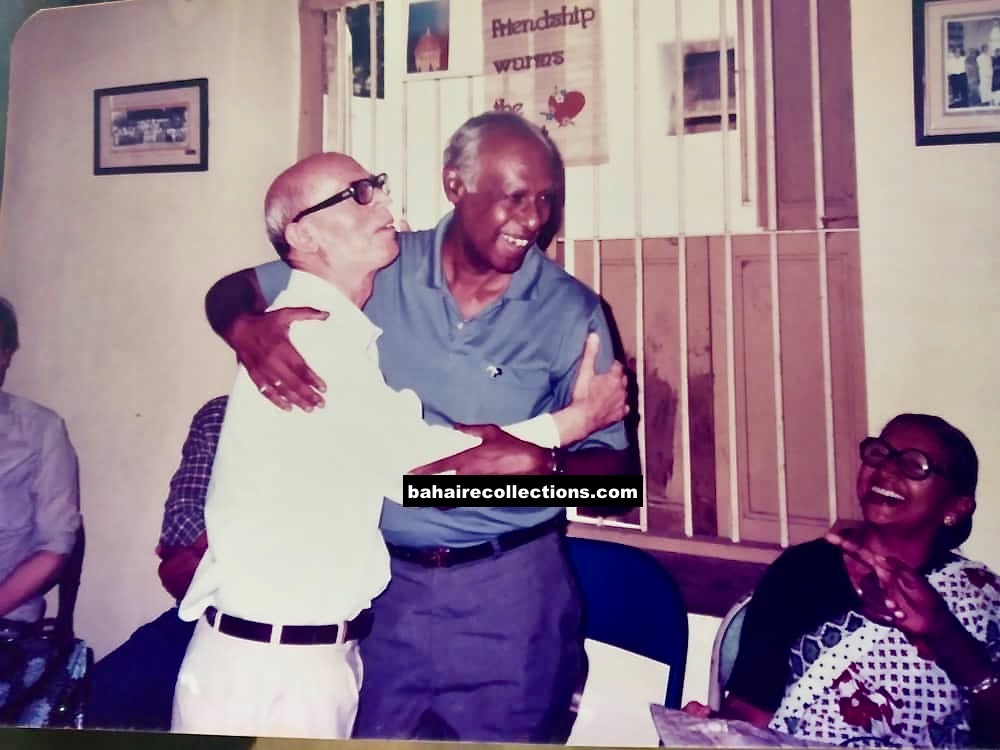
Board Member and Iranian Pioneer to Tamilnadu Mr. Bahá’í Poostchi hugging Thevar at the farewell gathering in the Madras Bahá’í Centre
Upon return to Malaysia, they were faced with re-adjustment issues. In 1984, while the family was still in Tamilnadu, Thevar’s eldest daughter Shyama migrated to Canada from India. Dictated by circumstances the Thevars had to sell off their house in Happy Gardens in Malaysia. When the Thevars returned to Malaysia in 1985 they first stayed for a few days in the home of the Satanams in Seremban and later found a house for rent in the Blossom Heights in the same town. Thevar’s children Chitra and Sumander who were still studying in India, returned a year later to join their parents. In 1986 Thevar served as Secretary of the Local Spiritual Assembly of Seremban. The family finally settled in Klang town and joined the activities there. Before leaving for India, their house in the Happy Gardens was buzzing with activities, and visitors kept coming almost every day. Now they did not have a house of their own and a to keep shifting from place to place. They had to live with the small pension drawn by Thevar, and the luxuries of the yore years were drastically reduced. But they had one great strength and comfort – the ever-burning love for the Blessed Beauty. Their warm hospitality that was a second nature in them continued in their own humble ways.
With the fast-failing health, Mary prayed for some of her wishes to be fulfilled. First, she and her husband went to Ontario in Canada in 1987 to visit their eldest daughter Shyama and her children. Taking advantage of this trip they also went to the House of Worship in Chicago and to the beloved Guardian’s resting place. At the Guardian’s resting place Mary was highly emotional that she stood at the threshold sobbing for a long time. That was most fulfilling to them at a time when they could not visit the Holy Land.
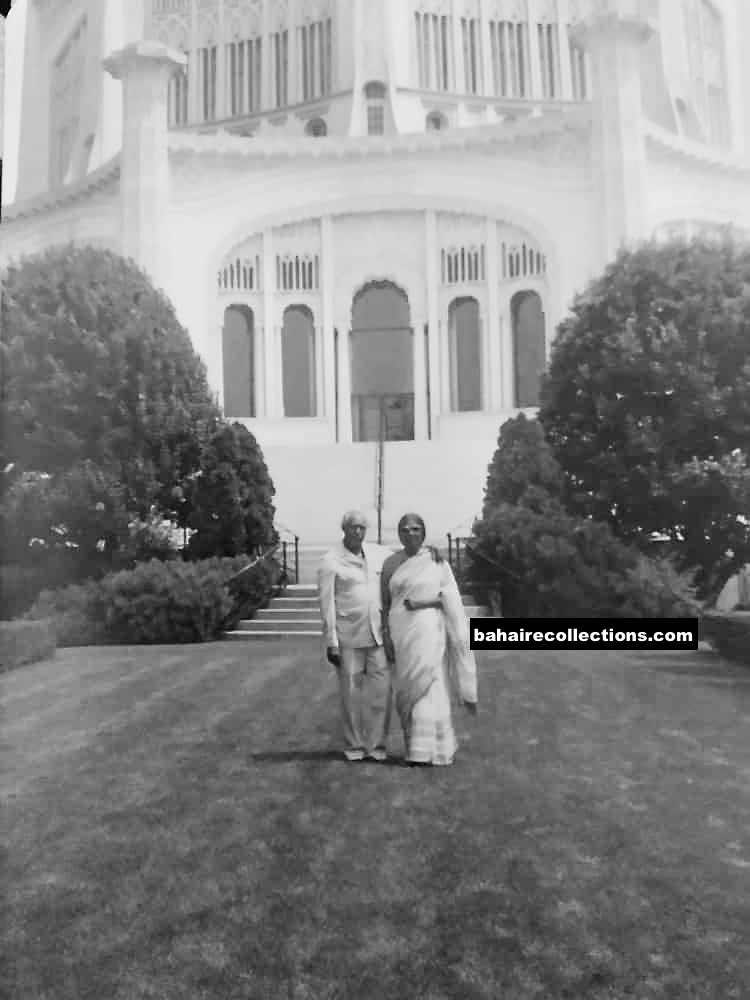
The Thevars at the Bahá’í House of Worship in Chicago, USA
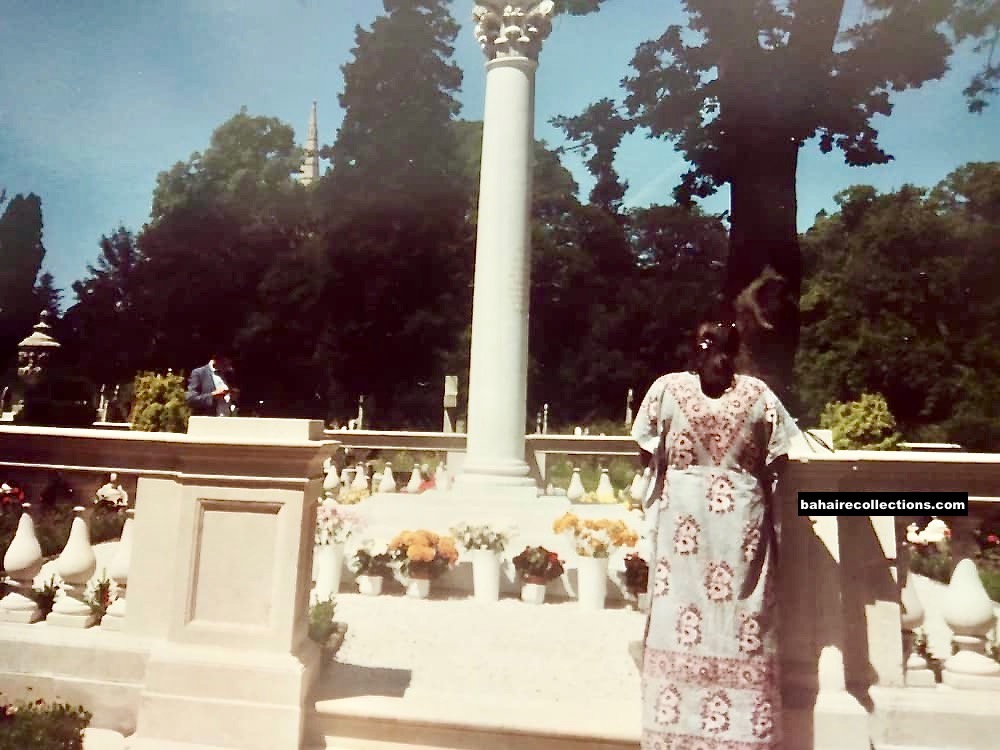
Mary at the resting place of the Guardian
They returned to Malaysia and tried to carry on with life. But a time came when Mary could not drag on any further. She had a premonition that her days were approaching. She made two requests to Thevar – one was that nobody should shed tears on her death, and the next was that Thevar should distribute sweets on the day of her passing. Suppressing his emotions, Thevar complied to carry out her last wishes when the time came. On 4 March 1989, Mrs. Mary Thevar ascended to the Abhá Kingdom of sudden heart failure in Klang town at the age of 48. Thevar who was her life companion and drew so much strength from her was totally at loss and felt utterly devastated. Though visibly shaken he managed to keep his cool as per her last wish, and urged those who came to pay their last respects not to shed tears, as per the request of his wife. That was a very difficult promise to carry out. Although Thevar knew that his wife had gone to a more blissful world, her passing sapped him of his strength, shield, and the greatest teaching companion.
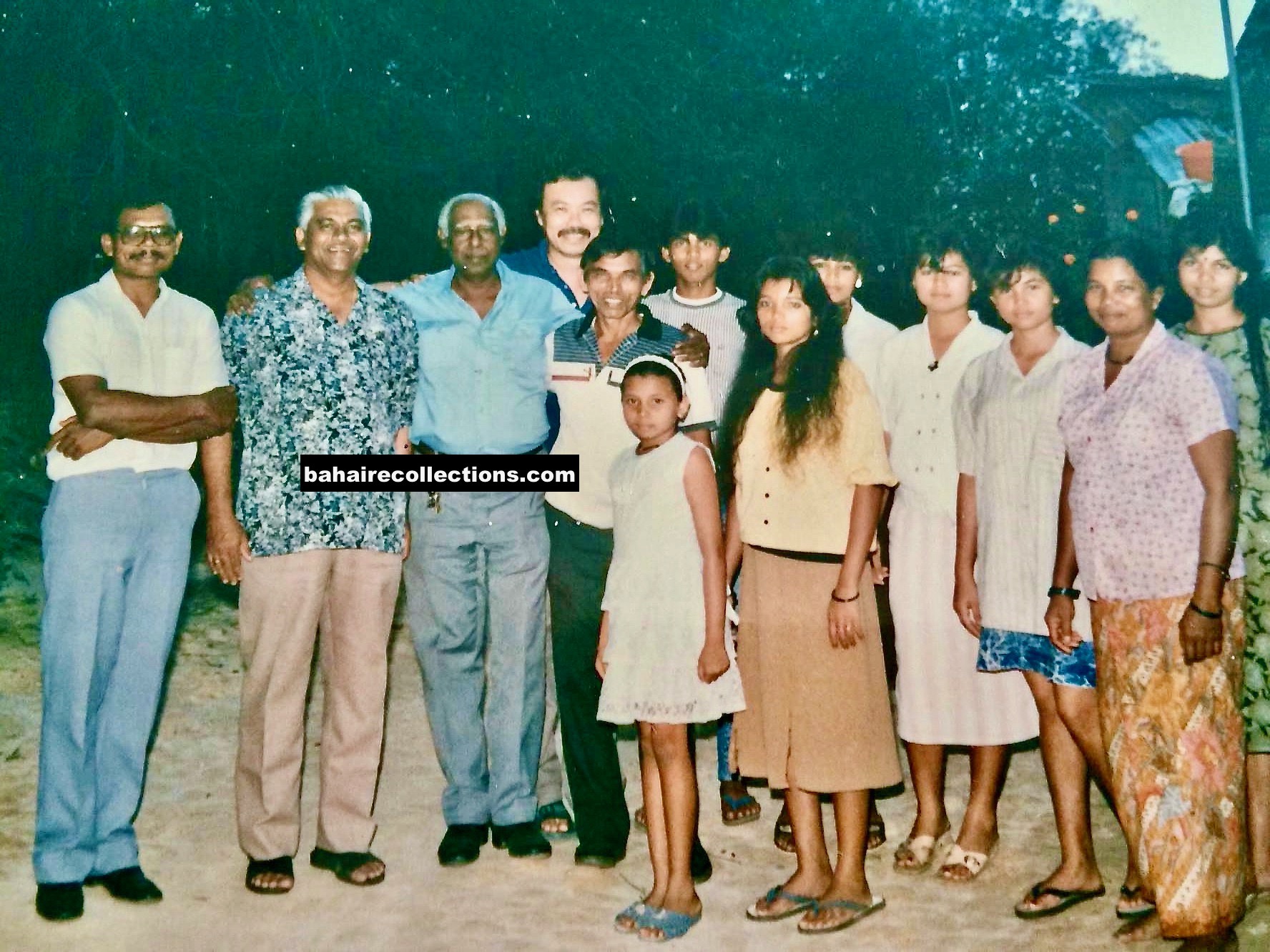
A lonely Thevar and friends with some believers from the Odisha community. L-R: Bornoh Das, S. Satanam, Thevar, Lee Wai Kok
Following Mary’s passing, Thevar was totally dejected and did not desire to live long. In every conversation with friends, he invariably was praising the greatness of his wife. During moments of privacy, he was praying to be removed from the earth faster. Realizing his depressed condition, his eldest daughter Shyama invited Thevar to be with her in Canada. Thevar went to Canada in 1991 and stayed with her. In Canada, he was on the Local Spiritual Assembly of Cornwall, Ontario. From Canada, he went to participate in the Second Bahá’í World Congress held in New York in November 1992. As he could not get accustomed to the cold and chilly climate in Canada, he came back in 1994 to reside with his daughter Chitra in Selayang, in the outskirts of Kuala Lumpur. He served on the Local Spiritual Assembly of Selayang on and off until his stroke in 1997. He succumbed to partial body paralysis and his walking was impaired. He fought hard and managed to recover to some extent. He then moved to a nearby simple apartment in Batu Caves. With his ill health, he still tried to be on the move for teaching. But without his wife around, the teaching spirit was not there in him. He spent his last days thinking of his wife. Whenever close friends wanted to take him out for dinner, he would decline saying, “No, thank you. Nothing could match my wife’s cooking.” As loneliness was killing him, he sent word to meet friends. Some of his close friends visited him from time to time to cheer him up during moments of loneliness in that remote apartment. In the author’s visit to Thevar in Batu Caves, out of blues, Thevar made a request that when he passed away the author should read out his eulogy. The author felt that it was just one more emotional explosion by a lonely man.
Sundays were Thevar’s regular teaching days. On the morning of Sunday 4 April 1999 Thevar sent his car to the workshop for some repairs and and drove his daughter Chitra’s car to visit Mr. Kariippanon Palaniappan popularly known as Karu in Sungei Buloh town. Karu is married to Kalai Selvi, daughter of Maria, who is the younger sister of Mary. At that moment of Thevar’s visit to Sungei Buloh, Karu was living in Kelantan state and used to visit Sungei Buloh over weekends to monitor the status of the Nuri Tuition Centre that belonged to him.
After lunch at Karu’s home on 4 April, Thevar asked the latter for a favor – to perform the final rites for him when he died. Karu just laughed it off as one of any old man’s wishes. But Karu felt he would not be able to perform the last rites, given that he was living in a faraway Kelantan. After conversing for a while, both of them went to a nearby restaurant for tea. Thevar ordered thosai (South Indian pancake) and tea. As he was sipping the tea and eating the thosai Thevar said, “All the sacrifices we are making for the Cause of Bahá’u’lláh are mere physical sacrifices, but we have to rise higher to make a lot of spiritual sacrifices as well…”. As he uttered these words he collapsed on the table. The restaurant owner phoned Karu’s wife Kalai Selvi, and she rushed over with her car with which they transported Thevar to a nearby clinic. There the doctor pronounced Thevar dead upon arrival and requested Karu to take Thevar to the government hospital. Thevar was taken to Sungei Buloh government hospital where his death was confirmed.
Thevar’s body was kept in the house of Karu and his last rites were performed by him as requested by Thevar. His close friends knew that he was missing his dear wife for one decade, though the heart attack was just the last straw on the camel’s back. He was laid to rest in the Bahá’í Memorial Park in Seremban.
Some days after the passing of Thevar, a memorial service was held in a school in Sungei Buloh town organised by Karu and his wife Kalai Selvi, where the author spoke of the life and services of Thevar, as had requested by Thevar.
Throughout his life, Thevar was a writer of letters to numerous people. In his letters to Bahá’ís, he would always start off with “He is God” and end with “In His Service.” His last words were for all to sacrifice more for the Cause.
Thus ended a life of a devoted and faithful follower of the Cause of Bahá’u’lláh. Thevar was always highly defensive of the Faith and stood for the protection of its image for which he could sometimes be very hard-hitting. But deep inside he was a very warm-hearted person, full of care and compassion. Without the knowledge of many, he had helped the needy believers. He was very fair-minded and level-headed in his judgment. At Local Assembly meetings, he could reason out things and solve complicated matters with ease and wisdom. In the outside world too, he was known as a very sincere and straightforward gentleman.
Thevar and Mary had been a great model as to how a couple should serve the Cause as one soul in different bodies, caring and praying for each other, sharing one thought and one purpose, placing the Faith above everything else, making Bahá’u’lláh the centre of their lives and relying fully on His unfailing assistance and mercy under all circumstances. Theirs was clearly and undoubtedly a path less travelled.
A. Manisegaran
30 September 2021
Copyright@bahairecollections.com
Comments can be posted through: info@bahairecollections.com